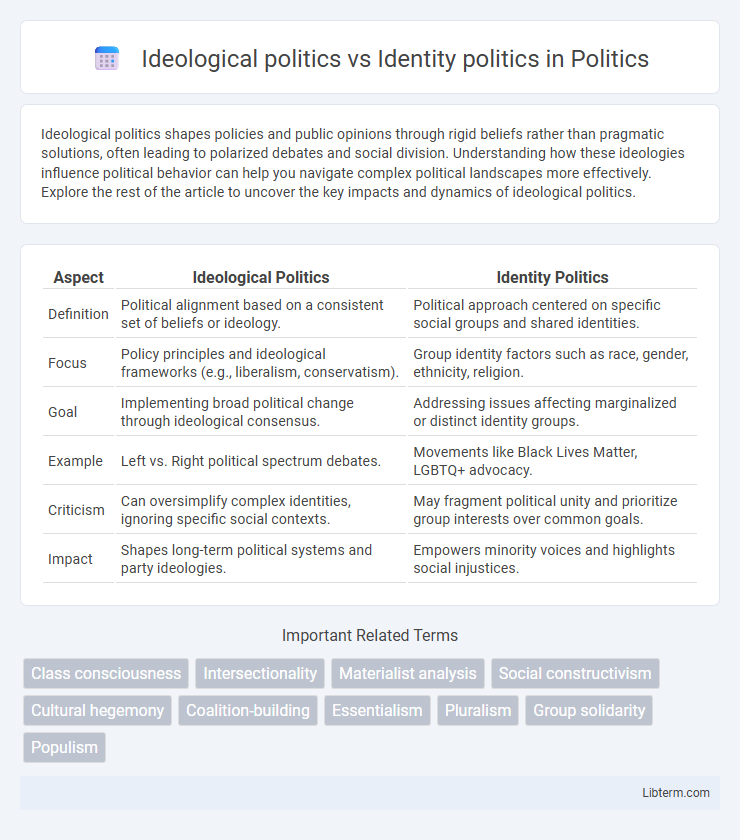Ideological politics shapes policies and public opinions through rigid beliefs rather than pragmatic solutions, often leading to polarized debates and social division. Understanding how these ideologies influence political behavior can help you navigate complex political landscapes more effectively. Explore the rest of the article to uncover the key impacts and dynamics of ideological politics.
Table of Comparison
| Aspect | Ideological Politics | Identity Politics |
|---|---|---|
| Definition | Political alignment based on a consistent set of beliefs or ideology. | Political approach centered on specific social groups and shared identities. |
| Focus | Policy principles and ideological frameworks (e.g., liberalism, conservatism). | Group identity factors such as race, gender, ethnicity, religion. |
| Goal | Implementing broad political change through ideological consensus. | Addressing issues affecting marginalized or distinct identity groups. |
| Example | Left vs. Right political spectrum debates. | Movements like Black Lives Matter, LGBTQ+ advocacy. |
| Criticism | Can oversimplify complex identities, ignoring specific social contexts. | May fragment political unity and prioritize group interests over common goals. |
| Impact | Shapes long-term political systems and party ideologies. | Empowers minority voices and highlights social injustices. |
Understanding Ideological Politics
Ideological politics centers on coherent sets of beliefs and principles, such as liberalism, conservatism, or socialism, which guide policy decisions and governance frameworks. This approach emphasizes shared values and political doctrines that transcend personal or group identities, aiming to create broad-based coalitions around ideas and visions for society. Understanding ideological politics requires analyzing how these belief systems shape political behavior, party platforms, and legislative priorities.
Defining Identity Politics
Identity politics centers on the political mobilization of groups based on shared characteristics such as race, gender, ethnicity, or sexual orientation, emphasizing lived experiences and social justice for marginalized communities. It contrasts with ideological politics, which is grounded in abstract principles and political philosophies like liberalism or conservatism. Defining identity politics involves understanding its focus on group-based identity as a primary lens for addressing systemic inequalities and political representation.
Historical Roots of Ideological Politics
Ideological politics traces its roots to the Enlightenment era, where reason, individual rights, and systematic political theories shaped foundational governance concepts. The rise of liberalism, conservatism, and socialism in 18th and 19th-century Europe established clear ideological frameworks that influenced national and global political landscapes. These ideologies provided structured approaches based on principles and policies rather than personal or group identities, distinguishing them from identity politics that center on social or cultural affiliations.
Origins and Evolution of Identity Politics
Identity politics originated in the civil rights movements of the 1960s and 1970s, emerging as marginalized groups sought political recognition based on shared experiences of oppression and cultural identity. It evolved from focusing solely on ideological beliefs to emphasizing group-specific issues such as race, gender, sexuality, and ethnicity, challenging traditional political categories. The rise of identity politics reshaped political discourse by prioritizing the visibility and empowerment of diverse social identities over broad ideological frameworks.
Core Differences: Ideology vs Identity
Ideological politics centers on a set of beliefs or principles guiding political decisions and policies, emphasizing universal values such as democracy, liberty, or socialism. Identity politics focuses on the experiences and interests of specific social groups based on race, gender, ethnicity, or sexual orientation, seeking representation and justice for marginalized communities. The core difference lies in ideology's abstract, principle-driven approach compared to identity's emphasis on lived experiences and group-specific advocacy.
Impact on Political Discourse
Ideological politics centers on broad principles and policy goals, fostering debates based on economic systems, governance models, and social values that encourage comprehensive political engagement. Identity politics emphasizes group-specific experiences related to race, gender, or ethnicity, shaping political discourse by highlighting marginalized voices and issues that traditional ideological frameworks may overlook. The tension between these approaches influences political polarization, with ideological politics seeking systemic change and identity politics advocating for recognition and justice within the existing structure.
Advantages and Challenges of Ideological Politics
Ideological politics offers a framework grounded in a consistent set of principles, facilitating long-term policy planning and coherent governance. It encourages broad coalitions across diverse groups by focusing on shared beliefs rather than personal characteristics, fostering unity and systemic change. Challenges include potential rigidity and alienation of individuals whose identities feel overlooked, sometimes limiting responsiveness to immediate social injustices.
Strengths and Criticisms of Identity Politics
Identity politics strengthens marginalized communities by emphasizing shared experiences and promoting social justice through targeted advocacy. Critics argue it can create social fragmentation and hinder broader coalition-building by prioritizing group identity over common ideological goals. Despite these concerns, identity politics remains vital for addressing systemic inequalities and elevating underrepresented voices in political discourse.
Intersections and Overlaps Between the Two
Ideological politics and identity politics intersect through shared goals of social justice, equity, and political representation, often influencing each other's agendas and strategies. Both approaches can overlap in mobilizing groups around collective experiences, where ideological frameworks provide context and identity politics emphasize lived realities. The dynamic interplay between ideology and identity shapes coalition-building, policy advocacy, and political discourse in contemporary movements.
Future Trends in Political Movements
Future trends in political movements indicate a shift towards hybrid approaches that blend ideological politics with identity politics, reflecting the complexities of modern societies. Emerging political groups increasingly leverage digital platforms to mobilize support by addressing both broad ideological goals and specific identity-based concerns, enhancing voter engagement and personalization of political messaging. Analysts predict that the interplay between these frameworks will shape policy debates and electoral strategies by prioritizing intersectionality and inclusivity in governance.
Ideological politics Infographic

 libterm.com
libterm.com